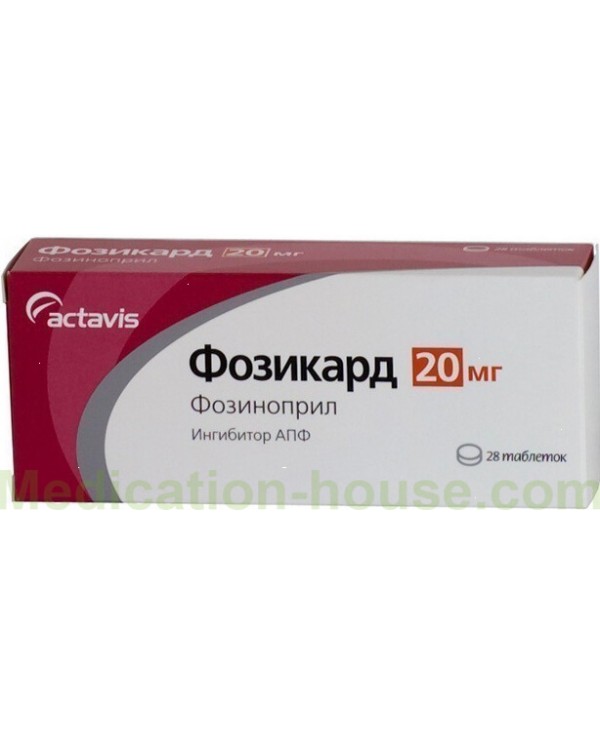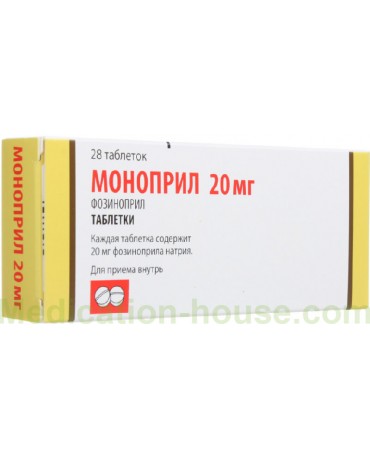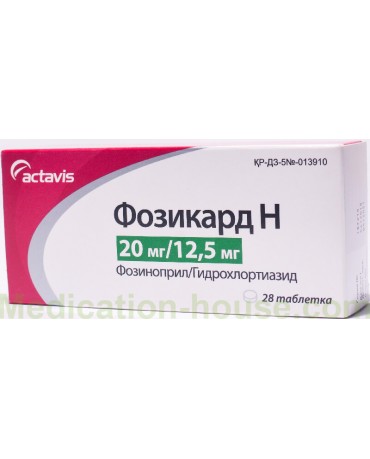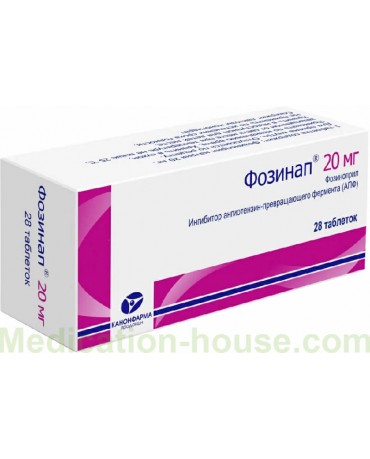Fosicard user manual
Reed more and buy Fosicard on this page
Fosicard is a drug of hypotensive and vasodilating action; an angiotensin-converting enzyme (ACE) inhibitor.
Release form and composition
Fosicard is produced in the form of tablets: flat-cylindrical, round, almost white or white, marked "FL 5", "FL 10" or "FL 20" for a dosage of 5, 10 or 20 mg, respectively (7 pieces in a blister, 4 blisters in a cardboard box; 10 pcs. in a blister, 3 blisters in a cardboard box; 14 pcs. in a blister, 2 blisters in a cardboard box).
1 tablet contains:
active substance: sodium fosinopril - 5, 10 or 20 mg;
additional components: pregelatinized corn starch (starch 1500), lactose monohydrate, glycerol dibegenate, croscarmellose sodium, microcrystalline cellulose.
Pharmacodynamics
Fosinopril is a prodrug that, after oral administration, is converted in the body into fosinoprilat, an active metabolite that inhibits the conversion of angiotensin I into the vasoconstrictor substance angiotensin II, which ensures vasodilation and reduces aldosterone production. The substance exhibits hypotensive, vasodilatory, diuretic and potassium-sparing effects. The agent lowers systemic arterial pressure (BP) and total peripheral vascular resistance (OPSR), inhibits tissue ACE. The hypotensive effect of Fosicard is also caused by blocking the metabolic transformation of bradykinin, which demonstrates pronounced vasodilating properties.
A decrease in blood pressure does not lead to changes in renal and cerebral blood flow, circulating blood volume (BCC), blood supply to skeletal muscles, internal organs, skin, as well as reflex activity of the myocardium. With prolonged therapy, the antihypertensive effect of the drug remains, the appearance of tolerance is not observed. After oral administration, the hypotensive effect develops within 1 hour, and its maximum is observed after 2-6 hours and lasts for 24 hours.
Pharmacokinetics
After oral administration, the active substance is absorbed from the gastrointestinal tract (GIT) by an average of 30-40%. Food intake does not affect the degree of absorption of the drug, but may slow down the rate of absorption. The maximum concentration (Cmax) in plasma, regardless of the dose used, is reached 3 hours after administration.
The active substance binds to blood plasma proteins by 95%. Fosinoprilat is characterized by a relatively small volume of distribution and an insignificant degree of binding to the cellular components of the blood. Fosicard does not pass through the blood-brain barrier, it is excreted from the body through the liver and kidneys equally. In patients with arterial hypertension with normal renal and hepatic function, the half-life (T½) of fosinoprilat can be 11.5 hours, with heart failure - 14 hours.
In the presence of impaired renal function [creatinine clearance (CC) below 80 ml / min / 1.73 m²], the total clearance of fosinoprilat from the body is on average 50% less than with normal renal function, but the bioavailability, absorption and binding of the substance to proteins plasmas in this case change insignificantly. The decreased excretion of the agent through the kidneys is compensated by the increased excretion through the liver. A moderate increase in the area under the concentration-time curve (AUC) in blood plasma (less than 2 times compared with the norm) is observed in people suffering from various degrees of renal failure, including end-stage CRF with CC below 10 ml / min / 1.73 m².
The clearance of the active substance of Fosicard in patients undergoing hemodialysis and peritoneal dialysis treatment is approximately 2 and 7%, respectively, in relation to the urea clearance values.
In patients with impaired liver activity (against the background of alcoholic or biliary cirrhosis), there is no noticeable change in the degree of hydrolysis of fosinopril, but its rate may be reduced. The total clearance of the active substance from the body in such patients is approximately 2 times lower than in those with normal liver activity.
Indications for use
arterial hypertension - as a means of monotherapy or in combination with other antihypertensive drugs, including thiazide diuretics;
chronic heart failure (CHF) - as part of a combination treatment.
Contraindications
Absolute:
hereditary and / or idiopathic angioedema, including after the use of other ACE inhibitors;
lactose intolerance, lactase deficiency, glucose-galactose malabsorption syndrome (Fosicard contains lactose);
age under 18;
pregnancy and lactation;
hypersensitivity to any of the constituents of the drug.
Relative (it is recommended to use Fosicard with extreme caution):
stenosis of an artery of a single kidney or bilateral stenosis of the renal arteries (possibly a reversible increase in the concentration of blood urea nitrogen and serum creatinine);
renal failure;
condition after kidney transplantation;
desensitization;
systemic connective tissue diseases, including systemic lupus erythematosus, scleroderma (the threat of agranulocytosis or neutropenia increases);
aortic stenosis;
CHF III – IV functional class according to NYHA classification, ischemic heart disease (IHD);
hyponatremia, since the risk of chronic renal failure (CRF), arterial hypotension, dehydration is aggravated;
cerebrovascular lesions (including cerebrovascular accident);
oppression of bone marrow hematopoiesis;
hyperkalemia;
diabetes;
elderly age;
hemodialysis treatment;
conditions accompanied by a decrease in the BCC (including vomiting, diarrhea);
diet with limited salt.
Instructions for use: method and dosage
The drug is taken orally, the dose is set individually.
Recommended dosage regimen:
arterial hypertension: initial dose - 1 time per day Fosicard 10 mg, the dose is selected taking into account the dynamics of blood pressure; maintenance dose - 10–40 mg once a day; in case of insufficient effect of monotherapy, additional use of a diuretic may be prescribed; if the reception of fosinopril is prescribed against the background of the ongoing treatment with a diuretic, then the initial dose of Fosicard should not exceed 10 mg, the treatment is accompanied by careful monitoring of the patient's condition;
CHF: initial dose - 1 or 2 times a day, 5 mg; depending on the therapeutic effect, the dose can be increased at weekly intervals to the maximum permissible daily dose of 40 mg taken once a day.
Side effects
digestive system: dryness of the oral mucosa, glossitis, stomatitis, change in body weight, impaired appetite, nausea, constipation, vomiting, intestinal obstruction, abdominal pain, dyspepsia, flatulence, anorexia, dysphagia, intestinal edema, pancreatitis, cholestatic jaundice, hepatitis ;
cardiovascular system: flushes of blood to the skin of the face, a marked decrease in blood pressure, palpitations, chest pain, tachycardia, hypertensive crisis, fainting, orthostatic hypotension, angina pectoris, arrhythmias, myocardial infarction, cardiac arrest;
hematopoietic organs: inflammation of the lymph nodes;
respiratory system: rhinorrhea, nosebleeds, laryngitis, pharyngitis, sinusitis, shortness of breath, dry cough, dysphonia, bronchospasm, pulmonary infiltrates;
nervous system: weakness, headache, dizziness, cerebral ischemia, stroke; when used in high doses - drowsiness, anxiety, insomnia, paresthesia, confusion, depression;
urinary system: the appearance or intensification of signs of chronic renal failure, oliguria, proteinuria;
musculoskeletal system: arthritis;
sensory organs: tinnitus, visual and hearing impairment;
metabolism: exacerbation of the course of gout;
allergic reactions: itching, skin rash, angioedema;
laboratory parameters: an increase in the level of urea, an increase in the activity of hepatic transaminases, hypercreatininemia, hyperbilirubinemia, hyponatremia, hyperkalemia, a decrease in the level of hemoglobin and hematocrit, an increase in the erythrocyte sedimentation rate (ESR), eosinophilia, leukopenia, neutropenia;
effect on the fetus: lowering blood pressure in the fetus and newborns, impaired fetal kidney formation, impaired renal function, hypoplasia of the skull bones, hyperkalemia, limb contracture, oligohydramnios, lung hypoplasia.
Overdose
Symptoms of an overdose of Fosicard can be violations of the water-electrolyte balance, bradycardia, severe hypotension, acute renal failure, shock, stupor.
If you suspect an overdose, you must stop taking Fosicard, wash the stomach, take sorbents (activated carbon). They also prescribe the use of vasodepressors, infusion of 0.9% sodium chloride solution and then carry out supportive and symptomatic treatment. Hemodialysis is ineffective.
Special instructions
Before starting the course, it is required to assess the previously prescribed antihypertensive therapy and the degree of increase in blood pressure, adjust the volume of fluid and salt consumed, if necessary, and analyze other clinical circumstances.
If Fosicard is used to treat severe arterial hypertension or in the presence of decompensated CHF, therapy should be started in a hospital setting.
Before and during treatment, it is necessary to monitor blood pressure, kidney activity, hepatic transaminase activity, the level of hemoglobin, potassium, creatinine, urea and the concentration of electrolytes in the blood.
During therapy with Fosicard, cases of angioedema have been reported. Development of edema of the larynx, pharynx, or tongue can lead to life-threatening airway obstruction. If such effects appear, it is necessary to stop taking the drug, carry out a subcutaneous injection of a solution of epinephrine / adrenaline (1: 1000) and other measures of emergency therapy.
There are rare reports of swelling of the intestinal mucosa during the period of use of ACE inhibitors. In this condition, there were complaints of abdominal pain in the presence or absence of nausea and vomiting; in some cases, swelling of the intestinal mucosa developed without facial edema, and the activity level of Cl-esterases did not exceed the norm. After stopping the use of ACE inhibitors, these symptoms disappeared. In patients receiving drugs of this group, with the development of abdominal pain, edema of the intestinal mucosa should be included in the differential diagnosis.
In patients who used fosinopril, during a dialysis session using highly permeable membranes, as well as during the procedure of low density lipoprotein apheresis with adsorption to dextran sulfate, there is a risk of developing anaphylactic reactions. In these cases, consideration should be given to the use of a different type of dialysis membrane or other antihypertensive treatment.
Before starting therapy with the drug and during its implementation, in order to prevent the development of agranulocytosis / neutropenia, the total number of leukocytes and the leukocyte formula should be determined (monthly in the first 3–6 months of the course and in the first year of treatment in patients with an increased threat of neutropenia).
The use of Fosicard for the treatment of uncomplicated forms of arterial hypertension can lead to the development of symptomatic arterial hypotension, which most often occurs during renal dialysis, or after intensive diuretic therapy, or on a diet with limited salt intake. Transient arterial hypotension is not a contraindication for taking Fosicard after taking measures aimed at restoring the BCC.
Treatment with ACE inhibitors in patients with CHF can lead to an excessive antihypertensive effect, exacerbating the risk of developing oliguria or azotemia with a fatal outcome. As a result, when prescribing Fosicard to patients with CHF during the first two weeks of the course, as well as with each increase in the dose of fosinopril or a diuretic, it is necessary to monitor patients from this risk group.
In the presence of hyponatremia and in the case of previous intensive treatment with diuretics, it may be necessary to reduce the doses of the latter. Some additional decrease in blood pressure against the background of heart failure is a desirable and expected effect, which, as a rule, is not a reason for refusing to take Fosicard. The degree of lowering blood pressure is maximal in the early stages of therapy and stabilizes within 1–2 weeks of the course without reducing the therapeutic efficacy of the drug.
Influence on the ability to drive vehicles and complex mechanisms
Caution should be exercised when driving vehicles or other complex mechanisms due to the possible appearance of dizziness during therapy, especially after taking the initial dose of Fosicard in patients receiving diuretics.
Application during pregnancy and lactation
During pregnancy, taking Fosicard is contraindicated. It is known that the use of ACE inhibitors in the II – III trimesters can cause damage or even death of the developing fetus. In newborns whose mothers were treated with ACE inhibitors during pregnancy, careful monitoring of the condition is required in order to timely detect the possible occurrence of arterial hypotension, hyperkalemia and oliguria.
Fosinopril passes into breast milk, therefore, it is contraindicated to use Fosicard during lactation. If during this period it is necessary to take the drug, breastfeeding should be discontinued.
Childhood use
For patients under 18 years of age, treatment with Fosicard is contraindicated, since there is no data confirming its effectiveness and safety in children and adolescents.
With impaired renal function
According to the instructions, Fosicard must be used with caution in patients with renal failure, bilateral renal artery stenosis or stenosis of an artery of a single kidney. With functional impairment of the kidneys, dosage changes are not required.
For violations of liver function
With functional disorders of the liver, changes in the dosage of the drug are not required. If during the period of therapy there is a noticeable yellowness and a significant increase in the activity of liver enzymes, therapy with Fosicard should be discontinued and appropriate treatment should be carried out.
Use in the elderly
In patients over 65 years of age and young patients, differences in the safety and efficacy of drug therapy were not found. At the same time, one should take into account the possible higher susceptibility to the action of Fosicard in some elderly patients due to the delayed excretion of the drug and an increased risk of overdose.
Elderly patients are advised to take Fosicard with caution.
Drug interactions
antacids (simethicone, magnesium or aluminum hydroxide) - absorption of fosinopril may decrease; these drugs must be used at intervals of at least 2 hours;
lithium - the serum concentration of lithium in the blood increases, the risk of developing lithium intoxication is aggravated; this combination requires caution;
non-steroidal anti-inflammatory drugs (NSAIDs) - the antihypertensive effect may be weakened, especially against the background of arterial hypertension and low blood plasma renin levels;
diuretics (in combination with dialysis or with a strict diet with limited salt intake) - a pronounced decrease in blood pressure may develop, especially during the first hour after taking the first dose of Fosicard;
potassium-sparing diuretics (triamterene, spironolactone, amiloride), potassium preparations - the risk of hyperkalemia increases; in patients with heart failure, diabetes mellitus, who are simultaneously taking these drugs, potassium-containing salt substitutes or other drugs that lead to the development of hyperkalemia (such as heparin), ACE inhibitors exacerbate the threat of an increase in serum potassium levels;
sulfonylurea derivatives, insulin - their hypoglycemic effect increases;
immunosuppressants, allopurinol, procainamide, cytostatic agents - the likelihood of developing leukopenia increases;
estrogens - the antihypertensive effect of fosinopril is weakened due to the ability of these substances to retain water;
medicines for general anesthesia, narcotic analgesics, antihypertensive drugs - the severity of the antihypertensive effect of Fosicard increases;
propranolol, chlorthalidone, hydrochlorothiazide, metoclopramide, nifedipine, propantheline bromide, cimetidine, acetylsalicylic acid, digoxin, warfarin - there is no change in the bioavailability of fosinopril.
Terms and conditions of storage
Store out of the reach of children at a temperature not exceeding 30 ° C.
Shelf life is 2 years.
Reviews
According to many reviews, Fosicard is an effective antihypertensive drug that reduces blood pressure to acceptable levels. Patients taking the drug also note its diuretic and potassium-sparing effect. It is recommended to use the remedy in reviews only as directed by the attending physician, observing the therapeutic scheme proposed by him. It should be remembered that in order to achieve positive results, Fosicard must be taken constantly, without omissions, try to lead a healthy lifestyle and perform procedures that strengthen blood vessels.
At the same time, patients note that with advanced stages of the disease, monotherapy with the drug is insufficient. There are no complaints about the occurrence of undesirable effects, in some reviews they indicate the bitter taste of the tablets.
Terms of sell
You don't need a prescription to buy Fosicard.




